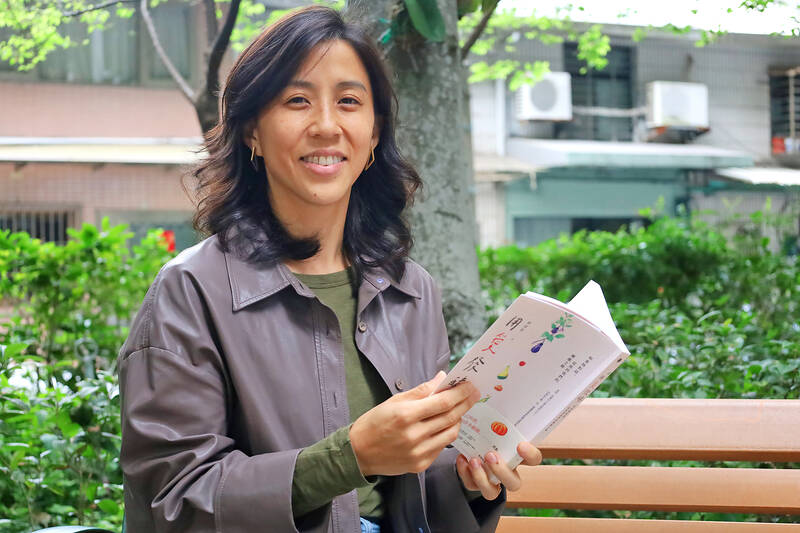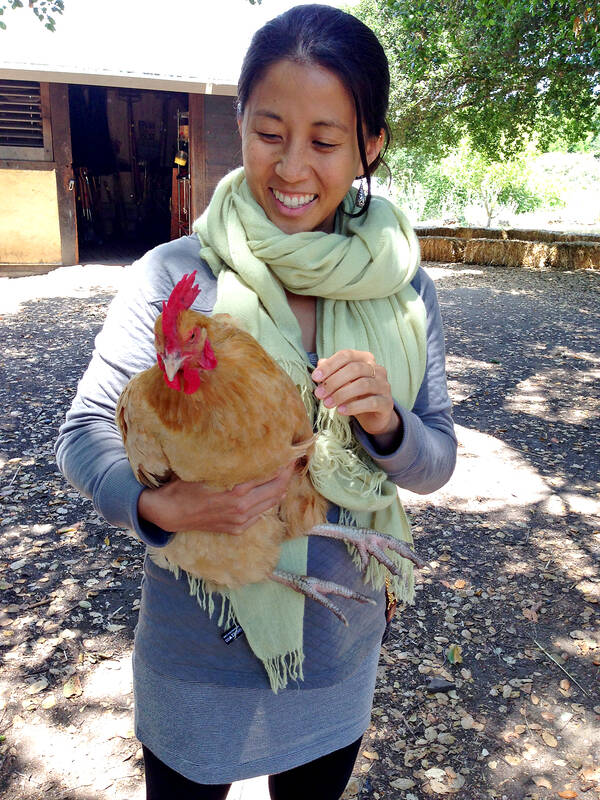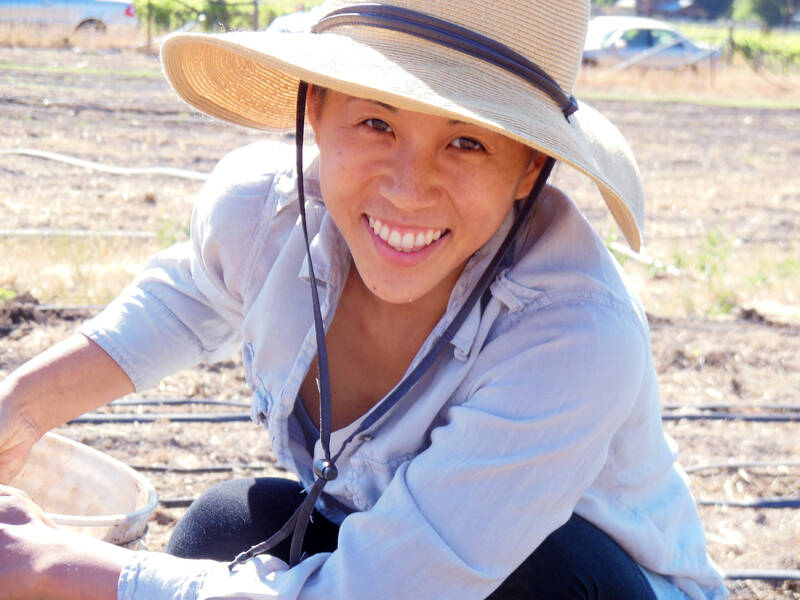Pei-Ru Ko (柯沛如) says her Taipei upbringing was a little different from her peers.
“We lived near the National Palace Museum [north of Taipei] and our neighbors had rice paddies. They were growing food right next to us. There was a mountain and a river so people would say, ‘you live in the mountains,’ and my friends wouldn’t want to come and visit.”
While her school friends remained a bus ride away, Ko’s semi-rural upbringing schooled her in other things, including where food comes from.

Photo: Thomas Bird, Taipei Times
“Most people living in Taipei wouldn’t have a neighbor that was growing food,” she says. “So I learned that food takes labor, it comes from people working hard. It doesn’t just show up in the market.”
Shopping at the local wet market was the setting for some of her happiest childhood memories, she tells Taipei Times.
“My mom would ask, what would you like and I could say I wanted to eat anything, and she would just say ‘let’s go get that.’”

Photo courtesy of Ko Pei-ro
Ko’s childhood dinner table was eclectic too, as her father is of southern Taiwanese stock, her grandmother a vegetarian Buddhist, while her mother has North China heritage.
Despite a “normal” childhood doing regular things like “making dumplings with mom,” as Ko reached adolescence, distant horizons began to beckon.
“My older brother was studying in the US and I learned he was having a very different education from me. He did sports, art, music… I was really interested in art and there just wasn’t a lot of that in Taiwan at the time. I was curious. I wanted a more global experience.”

Photo courtesy of Ko Pei-ro
After badgering her parents, Ko was permitted to go study state-side, an experience she found enriching from the get-go.
“Everything was just different, tasting pizza, experiencing snow.”
After graduating high school, Ko stayed on to further her education, enrolling in Williams College. It was during her time in Massachusetts that they she would develop many of the skills she’d later use after founding a non-profit Real Food Real Stories in 2014 (later renamed Food Culture Collective.)
“I basically created my own major. It was called Art for Social Change. And I started a program called ‘let me tell you a story.’ I like working with people, skipping the superficial and having real conversations. To me, that’s a form of art, bringing people together to connect and talk about meaningful things.”
CURATIVE CUISINE
Ko returned to Taiwan in 2009 and was about to enter the job market when she suddenly fell ill.
“At first, we didn’t know what was wrong with me. Then a doctor did an MRI scan and found a blood clot in my brain. I learned I had antiphospholipid syndrome, which accounted for my fatigue and the other symptoms I was having.”
Various medicines were prescribed to treat Ko’s condition. But frustrated with her protracted recovery, she hopped a flight to California, this time to practice yoga at White Lotus Foundation in Santa Barbara.
“One day, I was crying because I couldn’t do some of the exercises and the chef there noticed me. She just floated in and was like, ‘what’s going on?’ I told her I was upset with my body, that I just wanted all the pain to stop. And she put her hands on my shoulders and said, ‘Honey, if you don’t accept it, how can you let it go?’ That was the beginning of me changing my relationship with myself. Because she was a chef, many of our conversations started to shift my relationship with food. I thought, maybe I can’t cure myself but at least I can learn to care for myself.”
This epiphany spurred Ko to enroll in a holistic culinary program in Bauman College, Berkley, which focused on “how you can prepare food for all kinds of different health conditions.”
After finishing the course, she enrolled in another program to further study nutrition.
She eventually found she was able to mitigate the symptoms caused by her autoimmune disease.
“I have an anti-inflammatory diet that is mostly organic, local, seasonal and just. I currently manage my condition with diet and lifestyle instead of medications,” she tells the Taipei Times.
FOOD FOR THOUGHT
Given Ko’s experience, you might imagine she’d come up with the ultimate cure-all recipe. Instead, she says, “I don’t believe there is one diet that fits everybody, that is perfect for every culture, season or age. I also don’t believe there’s just one way of thinking about a given body type. So I never give a prescription because I think everyone’s body is different.”
Ko also dislikes labels applied to her, be it “foodie,” “food mentor” or even “good food advocate.”
“What is good?” she asks, rhetorically.
Instead, what Ko advocates is “Food that feeds our collective wellness. It needs to be delicious. It needs to be joyous. And it needs to feed generations.”
To cultivate a better understanding of food, and nurture more positive relationships between people and what they consume, Ko and her “co-conspirators” in California created “a community of food workers, culture bearers and creatives,” who used “storytelling, art, and cultural experiences to reorient towards food as life source…”
Food Culture Collective ran for six years with Ko at the helm. Although it now has a new executive director, she remains on the board and committed to the cause.
Ko returned to Taiwan in 2020 just as the COVID-19 pandemic brought the curtain down on a lot of public activities the world over. She kept herself busy writing her first Chinese-language book, Ferment with Love: Healing through Food Collectively (用愛發酵), which, she says, includes much of the nutritional wisdom garnered over two decades studying and working in the US.
She is now helping Taipei residents “embark on a transformative journey towards collective well-being” and will be heading a discussion tomorrow evening hosted by the Taipei Salon titled Flavors For Change.
“I’m interested in talking to people who are curious about their relationship to food. They could be at the very beginning of the journey. They could be finding difficulty in finding a balance in life. It doesn’t matter.”
Ko is also continuing her own journey, currently getting reacquainted with the culinary and agricultural landscape of her homeland.
“I feel like there’s still so much I need to learn about Taiwan,” she says.
Although she recognizes food culture in Formosa is quite different from that in the US, the “general principles” remain.
“We need to eat in a way that’s good for us, for others and for our planet,” she says.

On April 26, The Lancet published a letter from two doctors at Taichung-based China Medical University Hospital (CMUH) warning that “Taiwan’s Health Care System is on the Brink of Collapse.” The authors said that “Years of policy inaction and mismanagement of resources have led to the National Health Insurance system operating under unsustainable conditions.” The pushback was immediate. Errors in the paper were quickly identified and publicized, to discredit the authors (the hospital apologized). CNA reported that CMUH said the letter described Taiwan in 2021 as having 62 nurses per 10,000 people, when the correct number was 78 nurses per 10,000

As we live longer, our risk of cognitive impairment is increasing. How can we delay the onset of symptoms? Do we have to give up every indulgence or can small changes make a difference? We asked neurologists for tips on how to keep our brains healthy for life. TAKE CARE OF YOUR HEALTH “All of the sensible things that apply to bodily health apply to brain health,” says Suzanne O’Sullivan, a consultant in neurology at the National Hospital for Neurology and Neurosurgery in London, and the author of The Age of Diagnosis. “When you’re 20, you can get away with absolute

May 5 to May 11 What started out as friction between Taiwanese students at Taichung First High School and a Japanese head cook escalated dramatically over the first two weeks of May 1927. It began on April 30 when the cook’s wife knew that lotus starch used in that night’s dinner had rat feces in it, but failed to inform staff until the meal was already prepared. The students believed that her silence was intentional, and filed a complaint. The school’s Japanese administrators sided with the cook’s family, dismissing the students as troublemakers and clamping down on their freedoms — with

As Donald Trump’s executive order in March led to the shuttering of Voice of America (VOA) — the global broadcaster whose roots date back to the fight against Nazi propaganda — he quickly attracted support from figures not used to aligning themselves with any US administration. Trump had ordered the US Agency for Global Media, the federal agency that funds VOA and other groups promoting independent journalism overseas, to be “eliminated to the maximum extent consistent with applicable law.” The decision suddenly halted programming in 49 languages to more than 425 million people. In Moscow, Margarita Simonyan, the hardline editor-in-chief of the